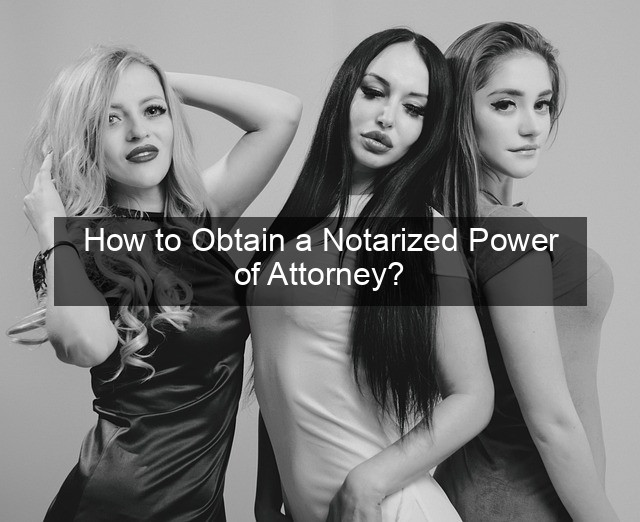How to Obtain a Notarized Power of Attorney?
- How to Obtain a Notarized Power of Attorney?
- How to Obtain a Notarized Power of Attorney
- Understanding Different Types of Powers of Attorney
- Durable Power of Attorney
- Non-Durable Power of Attorney
- Special Power of Attorney
- Steps to Obtain a Notarized Power of Attorney
- Choosing an Agent
- Preparing the Power of Attorney Document
- Notarization Process
- Importance of a Notarized Power of Attorney
- Legal Validity
- Preventing Fraud
- Maintaining and Revoking a Power of Attorney
- Storing Your POA
- Revoking a POA
- Conclusion
- Frequently Asked Questions (FAQs)

How to Obtain a Notarized Power of Attorney
A Power of Attorney (POA) is a crucial legal document that grants another person, called an agent or attorney-in-fact, the authority to act on your behalf. This can range from managing finances and property to making healthcare decisions. A notarized Power of Attorney adds an extra layer of validity and security, confirming your identity and signature. This prevents fraud and ensures the document is legally binding. Understanding the process of obtaining a notarized POA is essential for anyone considering this important legal arrangement. Whether you’re planning for future incapacitation, managing affairs while abroad, or simply need assistance with specific tasks, a properly executed POA can provide peace of mind and facilitate smooth transactions. This comprehensive guide will walk you through the steps involved in obtaining a notarized Power of Attorney, ensuring you’re well-prepared and informed.
Understanding Different Types of Powers of Attorney
Durable Power of Attorney
A Durable Power of Attorney remains in effect even if you become incapacitated. This type of POA is crucial for long-term planning, ensuring your agent can continue managing your affairs if you’re unable to do so yourself. It provides continuity and prevents legal complications should you experience a debilitating illness or injury. Choosing a durable POA offers significant protection and peace of mind for the future.
It’s essential to discuss your wishes and intentions with your chosen agent before implementing a Durable Power of Attorney. Open communication ensures they understand your preferences and can act accordingly in various situations. This discussion also allows you to address any potential concerns or questions they may have.
Selecting a trustworthy and capable agent is paramount when establishing a Durable POA. This individual will have significant control over your finances and decisions, so choose someone you implicitly trust and who has your best interests at heart. Consider their organizational skills, financial acumen, and willingness to take on this responsibility.
Non-Durable Power of Attorney
A Non-Durable Power of Attorney is effective only for a specific period or until a particular event occurs. This type of POA is often used for limited purposes, such as authorizing someone to sign documents on your behalf while you’re unavailable. It terminates automatically if you become incapacitated.
Non-Durable POAs are often utilized for specific transactions, such as closing a real estate deal or managing a business matter while you’re out of the country. They provide a convenient way to delegate authority without granting broad, ongoing powers.
Clearly defining the scope and duration of a Non-Durable POA is crucial to avoid misunderstandings or misuse. Specify the exact tasks your agent is authorized to perform and the timeframe within which they can act.
Special Power of Attorney
A Special Power of Attorney grants authority for a specific purpose or act. This type of POA is highly focused, limiting the agent’s power to a particular task, such as selling a property or handling a legal matter. It automatically terminates once the specified act is completed.
Special POAs offer a precise and controlled way to delegate authority without granting broad powers. They are often used in situations where a specific task needs to be handled by someone other than yourself, such as signing a contract or managing a single financial transaction.
When creating a Special POA, it’s essential to clearly define the specific act or purpose for which the agent is authorized to act. This clarity prevents any ambiguity and ensures the agent’s actions remain within the designated boundaries.
Steps to Obtain a Notarized Power of Attorney
Choosing an Agent
Selecting an agent is a crucial step. This person will have the authority to act on your behalf, so choose someone you trust implicitly. Consider their reliability, responsibility, and understanding of your wishes. Discuss your expectations and ensure they are willing to accept the responsibility.
Open communication with your chosen agent is vital. Clearly outline your intentions and preferences regarding the management of your affairs. This discussion ensures they understand your wishes and can act accordingly in various situations.
Ensure your chosen agent is comfortable and capable of handling the responsibilities entrusted to them. This includes understanding the legal implications and being willing to act in your best interests.
Preparing the Power of Attorney Document
You can download POA templates online or consult with an attorney to draft a document tailored to your specific needs. A well-drafted POA should clearly outline the powers granted to the agent, the duration of the agreement, and any specific instructions or limitations.
State laws vary regarding POA requirements, so it’s crucial to ensure your document complies with the regulations in your jurisdiction. Using a template specific to your state can help ensure compliance.
Review the document carefully before signing to ensure it accurately reflects your wishes and intentions. Any errors or omissions could have significant legal consequences.
Notarization Process
Find a qualified notary public. Many banks, post offices, and law offices offer notary services. Ensure the notary is authorized to perform notarizations in your state.
Bring your unsigned POA document and valid government-issued photo identification to the notary. The notary will witness your signature and verify your identity.
The notary will complete the notarial certificate, affix their official seal, and record the transaction in their notary journal. This process officially validates the document and confirms its authenticity.
Importance of a Notarized Power of Attorney
Legal Validity
Notarization provides legal validity to the document, ensuring it is recognized and accepted by courts and other institutions. This is crucial for avoiding disputes or challenges to the agent’s authority.
A notarized POA provides a higher level of assurance and protection against fraud. The notary’s verification of your identity and signature helps prevent unauthorized use of the document.
Many institutions, such as banks and government agencies, require notarization for POA documents to be considered valid. This ensures the agent can act on your behalf without encountering obstacles.
Preventing Fraud
Notarization helps deter fraud by requiring your physical presence and verification of your identity. This makes it significantly more difficult for someone to forge a POA document.
The notary’s seal and signature provide an official record of the transaction, adding an extra layer of security and authenticity to the document.
By verifying your signature and identity, the notary helps ensure the POA is a genuine expression of your wishes and intentions.
Maintaining and Revoking a Power of Attorney
Storing Your POA
Keep your original notarized POA in a safe and accessible location. Inform your agent of its whereabouts and provide them with copies if necessary.
Consider storing a digital copy of your POA in a secure online vault or with a trusted attorney. This ensures access to the document even if the original is lost or damaged.
Review your POA periodically to ensure it still aligns with your wishes and circumstances. You may need to update or revoke the document if your needs change.
Revoking a POA
You can revoke a POA at any time, provided you are mentally competent. This requires creating a written revocation document and notifying your agent and relevant institutions.
Consult with an attorney to ensure the revocation process is handled correctly and complies with state laws. Proper revocation is essential to prevent any further actions by your former agent.
It’s crucial to notify all parties who have received copies of your POA about the revocation. This includes banks, financial institutions, and any other relevant organizations.
Conclusion
Obtaining a notarized Power of Attorney is a significant legal process that requires careful consideration and planning. By understanding the different types of POAs, following the necessary steps, and choosing a trustworthy agent, you can ensure your affairs are handled according to your wishes. A properly executed POA provides peace of mind, knowing your interests are protected, whether you’re planning for the future or simply need assistance with specific tasks. Don’t hesitate to seek legal advice if you have any questions or concerns about the process. A clear understanding of the legal implications and requirements will help you make informed decisions and establish a secure and effective Power of Attorney.
Frequently Asked Questions (FAQs)
Below are some common questions about Powers of Attorney:
| Question | Answer |
|---|---|
| What is the difference between a general and limited Power of Attorney? | A general POA grants broad authority, while a limited POA specifies the exact powers granted to the agent. |
| Can I revoke a Power of Attorney at any time? | Yes, you can revoke a POA as long as you are mentally competent. |
Related Posts |





